(Interview) – Shortly after the formation of the new government, Burmese President Thein Sein formed three groups with a total of nine members to serve as advisers on political, economic and legal affairs.
(Interview) – Shortly after the formation of the new government, Burmese President Thein Sein formed three groups with a total of nine members to serve as advisers on political, economic and legal affairs. The Political Advisory Group includes Ko Ko Hlaing, Dr. Nay Zin Latt and Ye Tint. The Economic Advisory Group includes Dr. U Myint, Set Aung and Dr. Tin Hla Bo. The Legal Advisory Group includes Police Colonel Sitt Aye (retired), Khin Aye Myint and Than Kyaw. Dr. U Myint has taught at the Rangoon Economic and Education University, and he has served in the Foreign Affairs Ministry and on the United Nations Economics and Social Commission. Mizzima reporter Myo Thant talked with U Myint on the role of scholars and intellectuals in government, his conversations with Aung San Suu Kyi and other matters.

Question: Please tell us how you came to be appointed a presidential adviser on economics.
Answer: He (the president) invited me to his office and offered me the chance to work for him as economic adviser.
Q: What suggestions and advice will you give the president?
A: I don’t know what he wants me to talk about. I’ll talk about what he wants. I’ll not give lectures to him.
Q: You have been on intimate terms with Aung San Suu Kyi. Have you discussed economic matters with her?
A: Yes, we meet each other occasionally, sometimes we talked about things, but not about economic matters. As both of us are music lovers, we talk about music, classical music, say Mozart. Sometimes we had just chit chat.
Q: Have you ever discussed economics with Aung San Suu Kyi?
A: We’ve talked about economics in general terms only. I have had no in-depth discussions with her. I just told her to do both politics and economics on a dual track. She understands what I said and is currently working that way.
Q: What did Aung San Suu Kyi say about you becoming a presidential economic adviser?
A: At that time, no official notification had been issued, but the offer had been made. I had already accepted the offer. She said to me that it was premature to say what should be done. I met her after the president made his inaugural address.
Q: Some people say the advisory bodies are being exploited and you will be scapegoats. How do you respond to these critics?
A: I welcome critics, the more critics, the more I like it. It’s good to hear criticism. In this way, we can get suggestions, but I won’t respond to them. I never work like that. I don’t respond to agreements or disagreements, congratulations or condemnations. I’ll continue my work no matter what people say. They have the right to say whatever they think will benefit the country. Isn’t that democracy? It’s not good to hear everything is only good. But they (the critics) must also say what we should do, what will be good for the country. Everybody can say, ‘Oh! They are useless’. I will not be short tempered with what they say. I think they are saying these things for the sake of the country. Everybody is trying to work for the betterment of the country, but views will be different. The real situation is understood only after hearing all views.
Q: So how do you view the idea of intellectuals serving in government?
A: I don’t think I am master of everything, and I can do nothing alone. There are many intellectuals in many fields. There are many issues facing our country. I see they might use us more in this way. I think such appointments are good.


